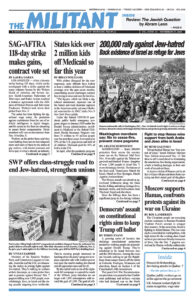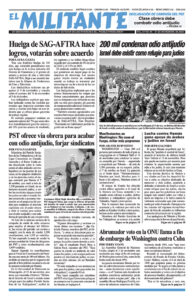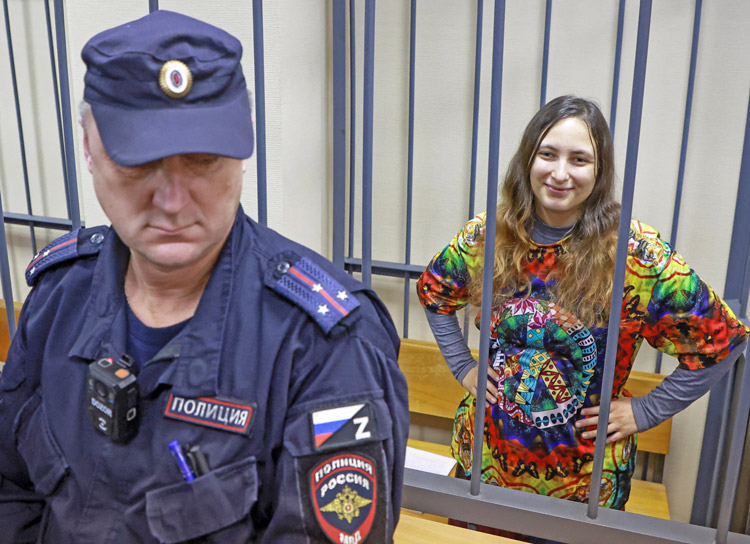The Ukrainian people are mounting resolute resistance to Russian President Vladimir Putin’s attempt to conquer their country. At the same time, Israel is fighting to defeat Hamas. The two wars mark a watershed in world politics, with high stakes for the working class. Israel seeks to prevent more bloody massacres of Jews, like the Oct. 7 pogrom carried out by Hamas with the enthusiastic backing of the bourgeois clerical regime in Iran.
Moscow’s top envoy at the U.N., Vasily Nebenzia, claimed Nov. 2 that Israel had no “right for self-defense” against Hamas’ murder of Jews, because Israel was an “occupying state.” This allegation is made by a regime that denies Ukraine is a legitimate country and is carrying out a genocidal assault against working people there.
If Israel doesn’t defeat Hamas, Jew-hating forces worldwide will be emboldened.
“Russia is using the Hamas attack in the most perverted way possible,” Gilad Erdan, Israel’s ambassador to the U.N., said in response to Nebenzia’s comments.
In sharp contrast to Moscow, the Ukrainian government has supported Israel’s right to defend itself. Hamas sought to kill as many Jews as it could on Oct. 7. Two days before, Moscow targeted a memorial service for a Ukrainian soldier, unleashing a missile strike in Hroza, killing more than 50 people, one-sixth of the village’s entire population.
“Russia needs this attack,” Ukrainian President Volodymyr Zelensky said, “to make its genocidal aggression the new normal for the entire world.” On Nov. 10 Ukrainian air defenses downed two-thirds of 31 Tehran-supplied attack drones that were launched by Moscow in a bombardment targeting the densely populated capital, Kyiv. The governments of Russia and Iran have drawn closer in the course of Moscow’s invasion of Ukraine.
Opposition in Russia to Ukraine war
The Putin regime is trying to stifle opposition to the war at home by detaining over 19,000 people. Prosecutors are seeking an eight-year prison sentence for Alexandra Skochilenko, who is charged with spreading “fake information” about the country’s armed forces.
“I just wanted to stop the war,” Skochilenko told a Russian court Nov. 8. The artist and musician was detained in April 2022 for covering price tags at a St. Petersburg supermarket with anti-war stickers. Her supporters keep images of her message tags on a website as they campaign for her freedom. One of her stickers reports how a Russian air strike hit a Mariupol theater killing over 400 civilians who were sheltering there. Others expose the toll on Russian conscripts, now in the hundreds of thousands, calling them “pointless deaths.”
Putin’s repression doesn’t always deter opposition to his regime’s war. Student Artyom Sakharov was fined for organizing a memorial event in March for people killed in the conflict. In October he held a poetry reading in the Siberian city of Barnaul, but because he concluded it with “peace to the world,” Sakharov was detained overnight and fined again.
The Kremlin is trying to shore up support for its war by funding the production of jingoistic war films. Despite budgets of millions, they have been spectacular flops.
One of the biggest box office bombs was “Svidetel” (Witness), the first movie about the war, with a budget of $2 million. It depicts Ukrainian soldiers, adorned with swastika tattoos, killing civilians as the “liberating” Russian invasion approaches. In the first four days it took in only $70,000 across over a thousand theaters.
“It’s a lie upon a lie upon a lie, and artists don’t even bother pretending they’re serious,” Konstantin, an English teacher from the western Russian city of Tula, told Al Jazeera. “It should be shown in Ukraine as a comedy.”
Askold Kurov co-produced “Welcome to Chechnya,” a 2020 award-winning documentary about the persecution of gays there. Russian film production, he told Al Jazeera, is based on state subsidies and the “embezzlement of huge budgets.”
“These days, nobody truly believes in what they’re doing,” Kurov said, “unlike Eisenstein or Dovzhenko.”
Sergei Eisenstein made the 1925 movie “Battleship Potemkin,” about a sailors’ mutiny backing the 1905 Russian Revolution. Ukrainian director Alexander Dovzhenko made “Earth” in 1930, about peasant reaction to the onset of forced collectivization of farms by the increasingly counterrevolutionary regime of Joseph Stalin as it reversed the gains of the Bolshevik-led Russian Revolution.
Both these movies were suppressed by Stalin, but are still studied as classics in film schools worldwide today.


